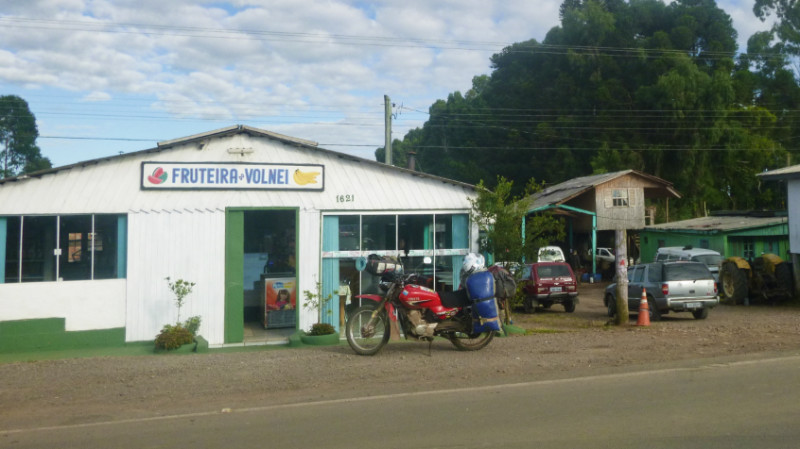 I AWOKE EARLY with the stale, oily air of the garage filling my nostrils and cool breeze ruffling the tent. Eager to avoid becoming a conspicuous obstruction to the day’s business. I’d packed away well before the 8AM opening time and wrestled the loaded bike out to the road to prop it on its stand close to the cafe door.
I AWOKE EARLY with the stale, oily air of the garage filling my nostrils and cool breeze ruffling the tent. Eager to avoid becoming a conspicuous obstruction to the day’s business. I’d packed away well before the 8AM opening time and wrestled the loaded bike out to the road to prop it on its stand close to the cafe door.
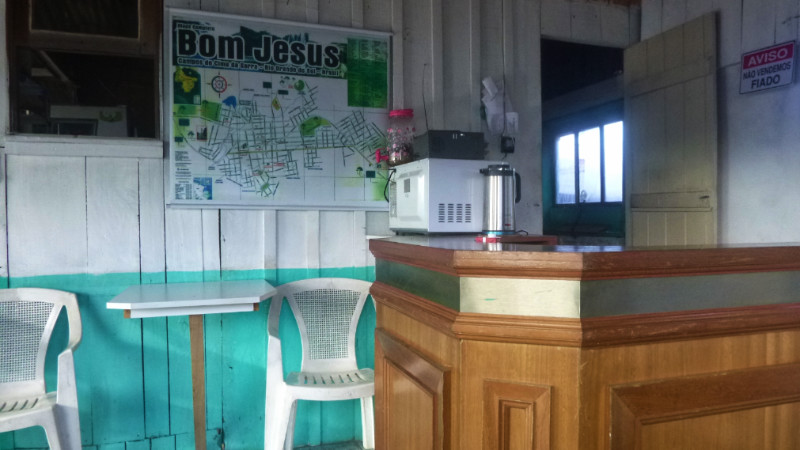 The empanada and milky instant coffee breakfast was but a sticking plaster on the my rumbling stomach. Expressing my gratitude to everyone at the cafe and the garage, I accelerated the couple of hundred metres to the gas station on the edge of town to discover a gleaming modern cafe wafting the irresistible fragrance of fresh ground coffee. When ordering, I forgot to say “Cafe com lieche sem asucre” – without sugar. The default seems to be served with plenty of it. Odd because it’s easier to add than remove.
The empanada and milky instant coffee breakfast was but a sticking plaster on the my rumbling stomach. Expressing my gratitude to everyone at the cafe and the garage, I accelerated the couple of hundred metres to the gas station on the edge of town to discover a gleaming modern cafe wafting the irresistible fragrance of fresh ground coffee. When ordering, I forgot to say “Cafe com lieche sem asucre” – without sugar. The default seems to be served with plenty of it. Odd because it’s easier to add than remove.
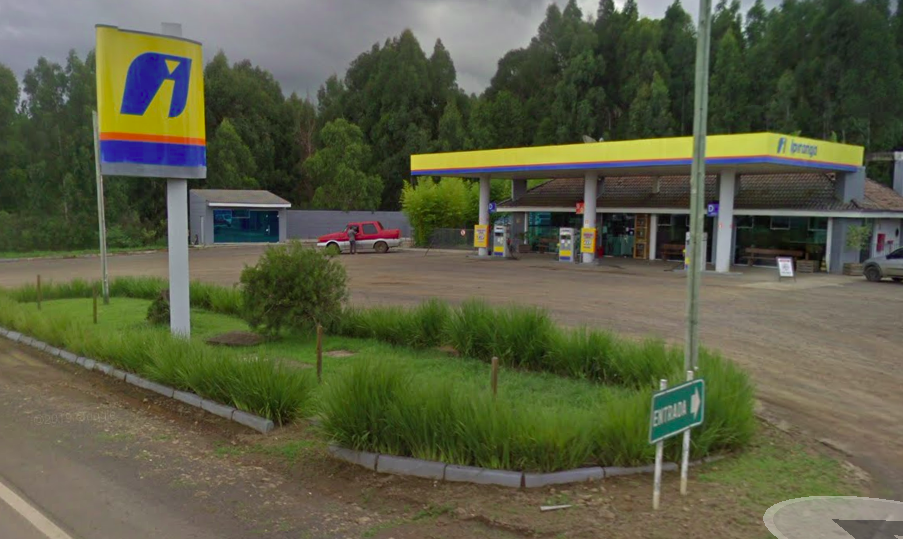 A woman with her family of three daughters at a table near the window eyed me with curiosity. Not many English people or Peruvian vehicles pass through Bom Jesus. The young girls spoke fairly good English and translated for their mother. The infrequency of these kinds of encounters in my journey tasted even sweeter than the coffee. Without interactions like this, punctuating long periods of solitude, I sometimes forget I even exist. Not that I think about it rather it’s the absence of thinking about it that gives the sensation. They left before I’d finished my syrupy coffee. The pump attendant topped up the fuel tank, and I waved a rolling goodbye across the forecourt and joined the quiet RS110 southward.
A woman with her family of three daughters at a table near the window eyed me with curiosity. Not many English people or Peruvian vehicles pass through Bom Jesus. The young girls spoke fairly good English and translated for their mother. The infrequency of these kinds of encounters in my journey tasted even sweeter than the coffee. Without interactions like this, punctuating long periods of solitude, I sometimes forget I even exist. Not that I think about it rather it’s the absence of thinking about it that gives the sensation. They left before I’d finished my syrupy coffee. The pump attendant topped up the fuel tank, and I waved a rolling goodbye across the forecourt and joined the quiet RS110 southward.
Back on the road, the cool morning air was gently stirred by the warm spokes of the sun rotating through the lazy, drifting cumulus as I cruised cheerfully around the undulating Rio Grande do Sul bends in and out of the shadows of the leaves dancing on the asphalt, 43km down to Princesa dos Campos, south of Jaquirana.
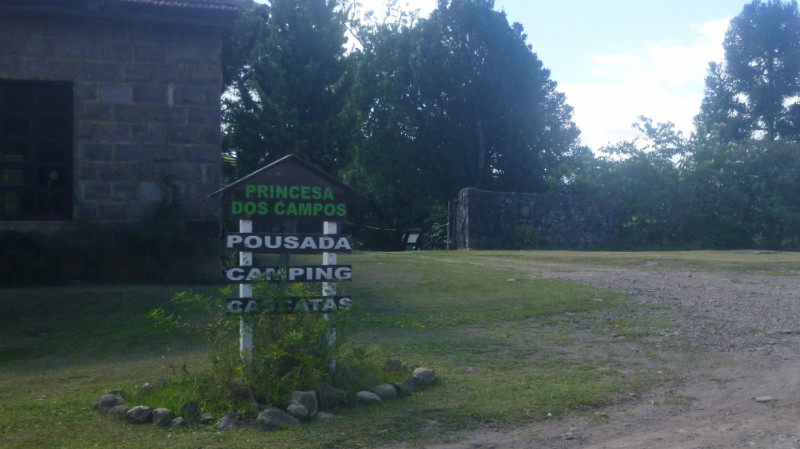 I caught sight of a small sign away from the road pointing off to the right, down an unlikely looking stony track past a non-descript restaurant sporting plastic patio chairs and tables on the porch. Spinning a U-turn back to the junction and 3km of gravel, dust and stone later I coasted over the dry tyre-worn tracks across the spartan lawn to park at the plastic chain drooped across the entrance of Princesa dos Campos.
I caught sight of a small sign away from the road pointing off to the right, down an unlikely looking stony track past a non-descript restaurant sporting plastic patio chairs and tables on the porch. Spinning a U-turn back to the junction and 3km of gravel, dust and stone later I coasted over the dry tyre-worn tracks across the spartan lawn to park at the plastic chain drooped across the entrance of Princesa dos Campos.
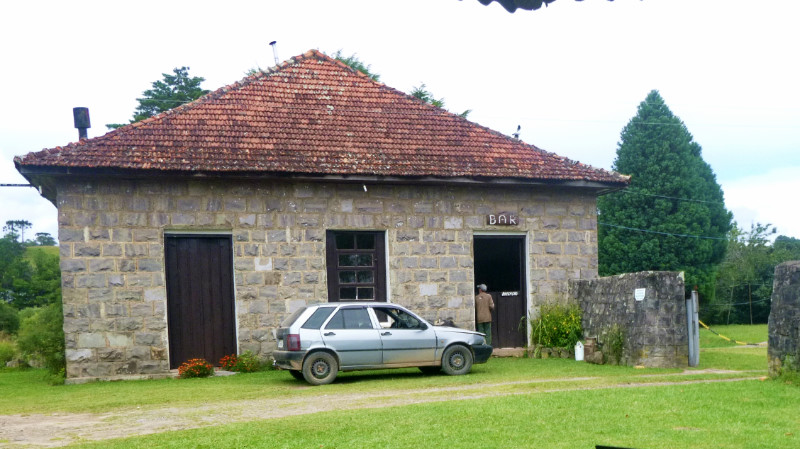 A crazy dog leapt in a barking frenzy around his earthen circle scuffed out underneath a tree, jerking his neck against a thick iron chain secured to the trunk by a frayed rope. A slender middle-aged woman strolled across the lawn to the gate to fail to comprehend my best Portuguese and retreated to find her husband.
A crazy dog leapt in a barking frenzy around his earthen circle scuffed out underneath a tree, jerking his neck against a thick iron chain secured to the trunk by a frayed rope. A slender middle-aged woman strolled across the lawn to the gate to fail to comprehend my best Portuguese and retreated to find her husband.
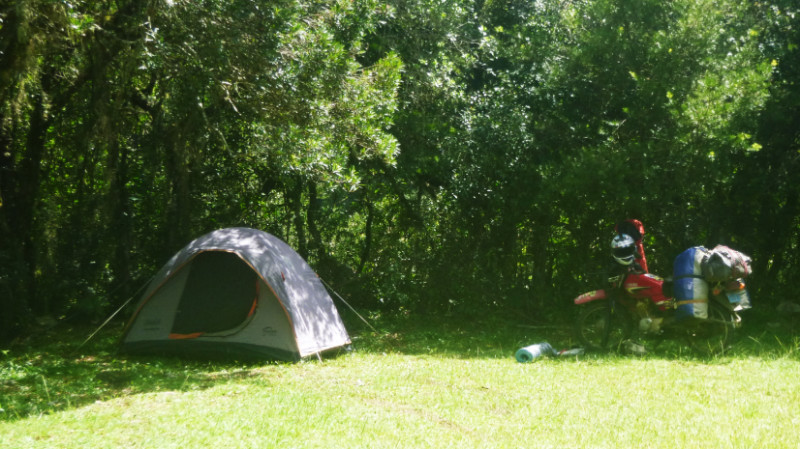 The price was R$30 a night but I offered R$100 for 4 nights and was booked in before noon, pitching my tent down close to the waterfall. I appeared to be the only guest here. Surprising for such an idyllic and well-kept site. There was work to do, a lot of blog editing to catch up on. This felt like the ideal retreat for working over a few days.
The price was R$30 a night but I offered R$100 for 4 nights and was booked in before noon, pitching my tent down close to the waterfall. I appeared to be the only guest here. Surprising for such an idyllic and well-kept site. There was work to do, a lot of blog editing to catch up on. This felt like the ideal retreat for working over a few days.
 I strung the hammock up between the trees next to an electric socket, perfect for both writing and relaxing. On the third day, I was laid in the hammock pondering how to get more food – the store being 30km away – and noticed the man from the cabana up the hill and with his four boys approach to invited me for lunch. “Sim, Obrigado” and I followed them up to the cabana.
I strung the hammock up between the trees next to an electric socket, perfect for both writing and relaxing. On the third day, I was laid in the hammock pondering how to get more food – the store being 30km away – and noticed the man from the cabana up the hill and with his four boys approach to invited me for lunch. “Sim, Obrigado” and I followed them up to the cabana.
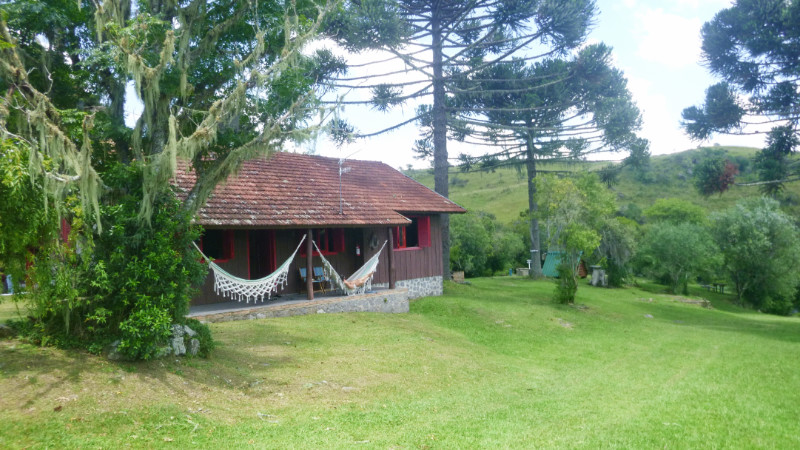 The boys spoke better English than the parents and we communicated quite well. From Caixas do Sul, they had arrived a couple of nights before for a short break exploring the nearby woods and swimming in the river.
The boys spoke better English than the parents and we communicated quite well. From Caixas do Sul, they had arrived a couple of nights before for a short break exploring the nearby woods and swimming in the river.
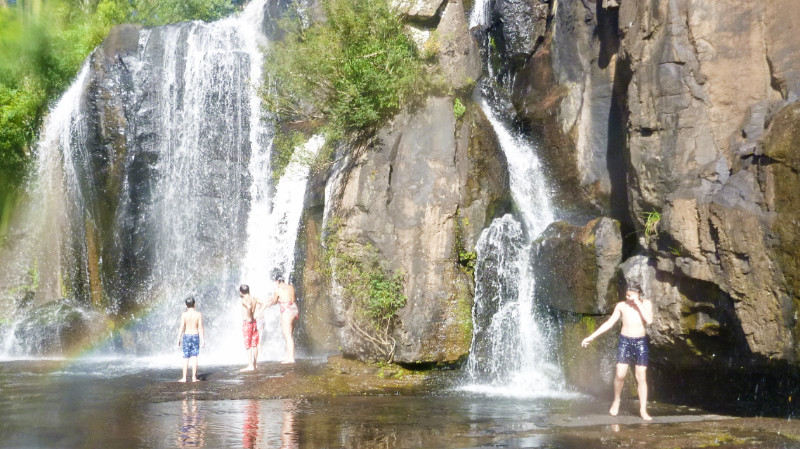 This was their last day. the boys had collected the spiny brown leaves from under the Araucaria tree and lit them in the grill. Flames roared up the chimney, smoke billowing back in the house.
This was their last day. the boys had collected the spiny brown leaves from under the Araucaria tree and lit them in the grill. Flames roared up the chimney, smoke billowing back in the house.
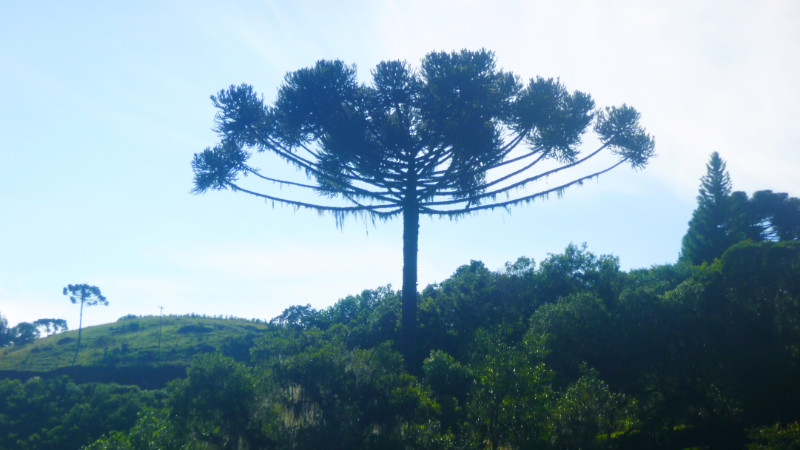 This was an enthusiastic kindling material never to be found again after leaving Brazil. We enjoyed a tasty barbecue with plenty of beer. After lunch, they started to pack ready to fo home, leaving me all the leftover food, bagged up with a couple of pans of pasta and potato stacked in the fridge. I had more food to hand now than I could remember since taking to the road.
This was an enthusiastic kindling material never to be found again after leaving Brazil. We enjoyed a tasty barbecue with plenty of beer. After lunch, they started to pack ready to fo home, leaving me all the leftover food, bagged up with a couple of pans of pasta and potato stacked in the fridge. I had more food to hand now than I could remember since taking to the road.
Their leaving left me suddenly in solitude, the contrast stimulating a feeling of empty sadness. It was just me again and I grounded myself reclining in the hammock with a movie on the Laptop, “Into the Wild.”
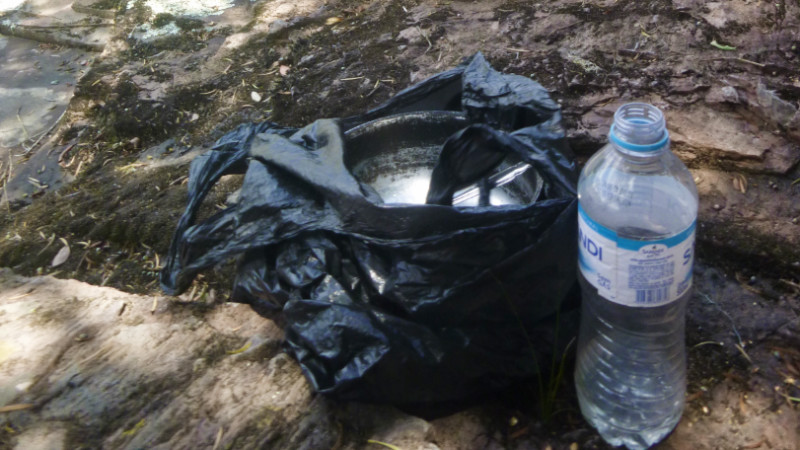 The next morning, I retrieved the pan of mashed potato from the fridge in the Cabana and wrapped it in a black plastic bag in the sun hidden behind a rock across the river to avoid its discovery and possible disposal while I spent a few hours writing.
The next morning, I retrieved the pan of mashed potato from the fridge in the Cabana and wrapped it in a black plastic bag in the sun hidden behind a rock across the river to avoid its discovery and possible disposal while I spent a few hours writing.
Early afternoon, I paddled across the river to gently feel the metal of the pan through the polythene, almost too hot to the touch and I picked up the bag not noticing the small black ants over the black plastic. They started to bite my hands before I could put the pan down and rinse them off in the river. Looking inside the pan, there were maybe still a dozen ants over the potato but most had been over outside of the bag. I stirred them into the mashed potato sat down by the rippling water to eat while basking in the dazzling yellow sunlight. It was a delicious moment for all my senses.
Meanwhile, another family had arrived and come down to bathe in the warm, shallow water and I gave them a wave as I waded back across and toward the tent. My hammock was draped across the sole access to their tent and so I tied it in the trees of the vacant picnic area on the lower level closer to the river before returning to the reception to upload my blog via their tardy narrow connection and to book another four nights.
 While I was busy in the restaurant another camper had arrived, pitching their trailer tent next to mine and making space shuffling my bike closer to my tent so I felt compressed into a corner.
While I was busy in the restaurant another camper had arrived, pitching their trailer tent next to mine and making space shuffling my bike closer to my tent so I felt compressed into a corner.
Something I’ve noticed all over South America, people don’t seem to bother about proximity to others. I could be the only tent at the end of a field and a car could turn up and park next to me with its booming stereo instead of parking at the far end as I would.
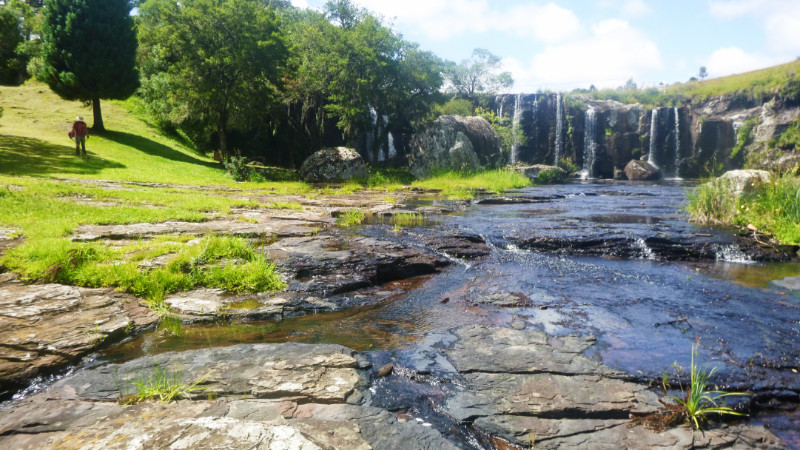 Pretty soon the rest of the site had filled up for the weekend forcing my hammock to be relocated next to my tent, between trees on the edge of our level, overhanging the drop to the lower level. Although it was a perfect hang and comfortable, the illusion of being suspended high in the trees was unnerving at first.
Pretty soon the rest of the site had filled up for the weekend forcing my hammock to be relocated next to my tent, between trees on the edge of our level, overhanging the drop to the lower level. Although it was a perfect hang and comfortable, the illusion of being suspended high in the trees was unnerving at first.
Philipe and Lis, the family that arrived during my ant and potato feast, speak good English and invited me for dinner with their daughters Lana and Olivia, and to share chimarrão together. Chimarrão or Maté is a local green tea, often shared through passing a cup of chopped leaves with hot water and sipping through a metal straw with a filter, in a similar fashion to the old pipe-of-peace scenes in old Cowboy and Indian movies.
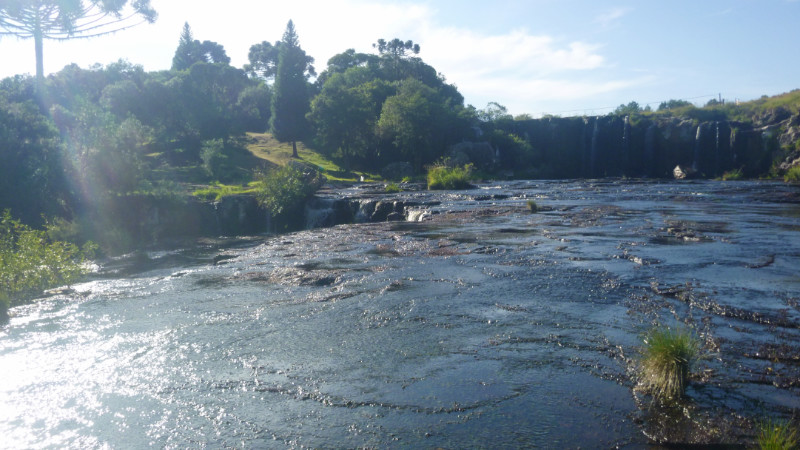 Sharing food, chimarrão and chocolate cake with the family felt almost like Christmas. My own family was thousands of miles away but to be included in this one reminded me of the importance of connection and community. I tried not to overstay my welcome and retired to the hammock in the balmy darkness for half an hour before another two cars invaded the lower camping area, setting up tents, tarps and lights to rival a modest music festival. I quickly packed away the hammock and retreated to the tent.
Sharing food, chimarrão and chocolate cake with the family felt almost like Christmas. My own family was thousands of miles away but to be included in this one reminded me of the importance of connection and community. I tried not to overstay my welcome and retired to the hammock in the balmy darkness for half an hour before another two cars invaded the lower camping area, setting up tents, tarps and lights to rival a modest music festival. I quickly packed away the hammock and retreated to the tent.
Food selection here at the restaurant was limited and I had already consumed my survival stash of peanuts. The menu seemed to only extend as far as ham and cheese toasted sandwiches. They were OK but quickly became boring. My language skills were limited too, which didn’t help with exploring food options and the proprietors hardly understood any of my attempts at Portuguese. Philipe said that he had experienced a similar problem, even though he lives only sixty miles away. They told Philipe “There is a man here from Peru, we don’t understand what he says. Maybe he leaves tomorrow or the day after, we don’t know…”
During the days that the site was busy, I sought sanctuary in the spacious and deserted restaurant. Another family arrived from Porto Alegre curious about the bike from Peru, Paulo and his wife didn’t speak English but Diego, the son, was pleased to be able to translate and practise his English since he needs it for his studies to become a doctor. they invited me to dinner, sharing barbeque, beer and conversation into the night. I enjoyed the company and conversation and promised to catch them before the left the next day and to visit when I got to Porto Alegre. The following morning, I awoke with a migraine and, by the time I’d surfaced, they’d gone. I never saw them again. Storms crept over the horizon that day and the first raindrops quickly saw off the handful of remaining families and I had the place to myself again well before dusk.
Down to my last 9 Real, I felt restless and desperate for cash. Jaquirana is 20km away, 30 if you want to avoid the rough, rocky route. I took the longer easier route. Exploring Jaquiarana revealed no ATM compatible with my cards so it was onward to Bom Jesus and back to the Bradesco Bank Lobby. Bom Jesus; a local town for local people. Nothing here for travellers but the Bradesco ATM.
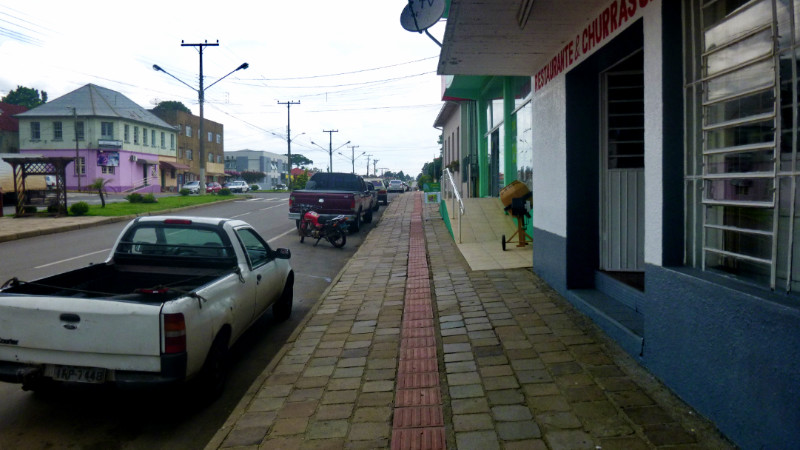 Now flush with cash, I took lunch at a basic Comedor and buffet, plates of fresh food covered with clingfilm. I was sat down, fussed over and welcomed like long-lost family. Plain but fresh food served with love and generosity.
Now flush with cash, I took lunch at a basic Comedor and buffet, plates of fresh food covered with clingfilm. I was sat down, fussed over and welcomed like long-lost family. Plain but fresh food served with love and generosity.
Outside, the sky grew dark and curled with grey. The heavy clouds unloaded their watery cargo over Bom Jesus, rinsing the town’s dusty film into the guzzling gutters. Meanwhile, staff and customers became transfixed to the TV screen by a news report. A helicopter had crashed onto a busy road in Sao Paulo killing a high profile TV reporter. Even without knowing who he was, the scenes looked dramatic, and unlucky for a truck driver who emerged from under a bridge to find find a helicopter suddenly plunge out of the sky directly in front of him.
The storm left as quickly as it arrived leaving the sky white and the air washed clean. Although damp, the air wasn’t cold and the tropical earth soon chased away the moisture, patch by patch along the road. By the time I got back, the sun shone brightly in a cobalt sky of candy floss cloud.
The next few days were invested knocking a dent into the blog trying to bring it up to date, which becomes a hard slog after the initial burst of inspiration and creativity evaporates. Time-consuming; working for love in sporadic bursts instead of the enduring incentive of a subsistent income.
I hung around for an extra week or so, the dog barking and leaping at his chain whenever he saw me commute between tent and restaurant; every time as if each was our first ever encounter.
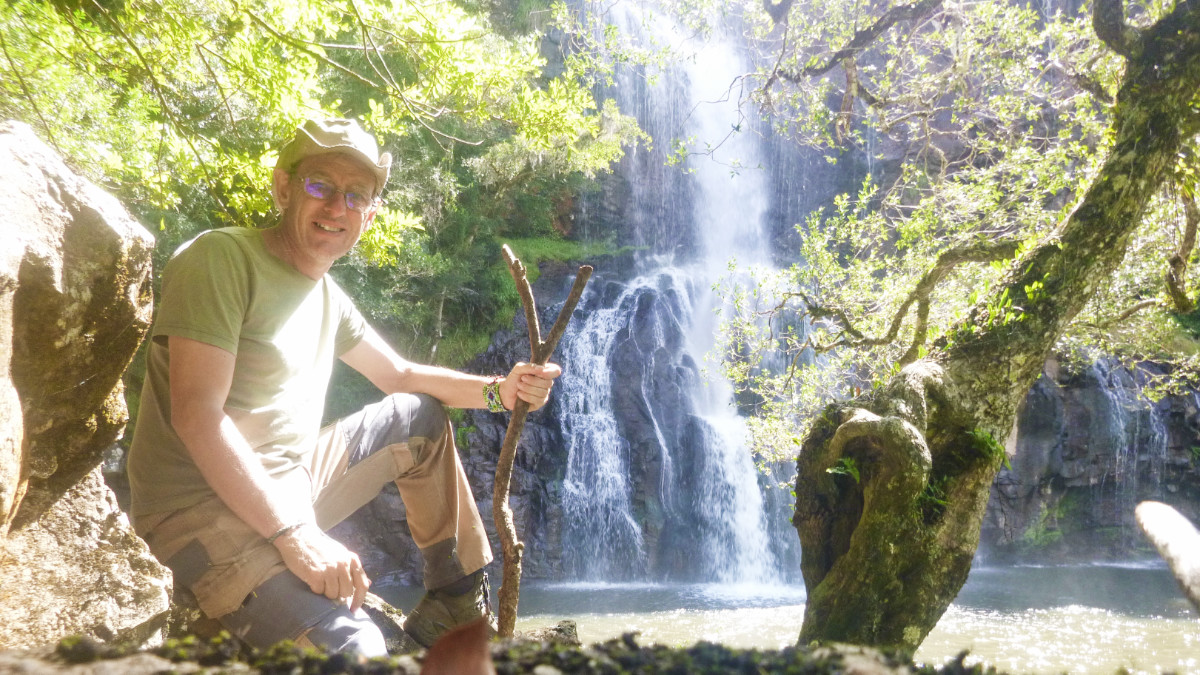 A couple of random days, the owners told me they were visiting family and locked me in the site until they returned. I didn’t mind. I had nature as my companion, a valley of deep woods and shallow rivers. Down the side of the hill, overgrown, dappled sunlit trails weaved between the trees and streams. The warm, still air beaded warm perspiration that trickled down my spine and the sense of shaded seclusion encouraged me to strip off and bathe in the crystal babbling waters; a timeless experience. Invisible from above the valley, this was God’s secret garden. All I was lacking was a woman, an apple and a snake…
A couple of random days, the owners told me they were visiting family and locked me in the site until they returned. I didn’t mind. I had nature as my companion, a valley of deep woods and shallow rivers. Down the side of the hill, overgrown, dappled sunlit trails weaved between the trees and streams. The warm, still air beaded warm perspiration that trickled down my spine and the sense of shaded seclusion encouraged me to strip off and bathe in the crystal babbling waters; a timeless experience. Invisible from above the valley, this was God’s secret garden. All I was lacking was a woman, an apple and a snake…
Apart from my clothing on the bank, there was nothing here to offer a clue as to what century or millennium this could be. This was a snapshot of a moment in eternity, a world now disappearing into an abyss of all-consuming, man-made industrial wealth and suffocating plastic. This sickness generously labelled ‘civilisation…’
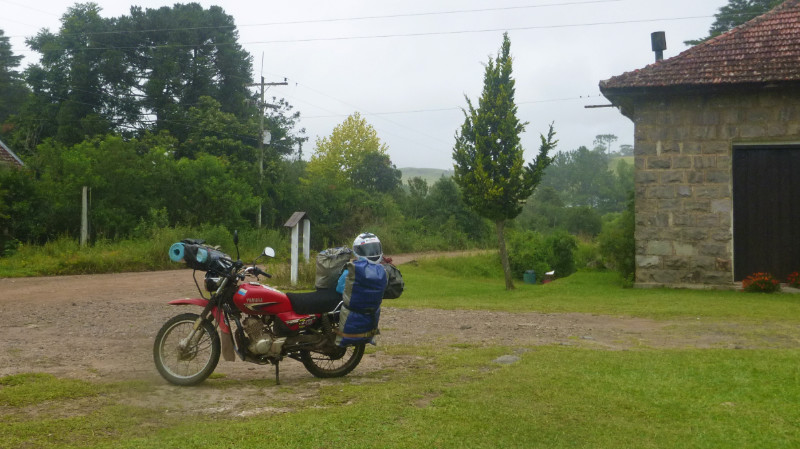 welve days after my arrival, it felt time to move on. Conscious of the date on the rubber stamp in the passport, now halfway through my three-month visa allowance in Brazil, I still had a lot to see before I needed to run for the border and I reluctantly loaded the bike and, instead of turning south on the more direct and rugged-looking 70km trail of the RS476 southwest to Canela via Lajeado Grande, turned northeast to join the RS110 and the paved route in a wide arc via São Francisco de Paula to the south because I liked its name…
welve days after my arrival, it felt time to move on. Conscious of the date on the rubber stamp in the passport, now halfway through my three-month visa allowance in Brazil, I still had a lot to see before I needed to run for the border and I reluctantly loaded the bike and, instead of turning south on the more direct and rugged-looking 70km trail of the RS476 southwest to Canela via Lajeado Grande, turned northeast to join the RS110 and the paved route in a wide arc via São Francisco de Paula to the south because I liked its name…


